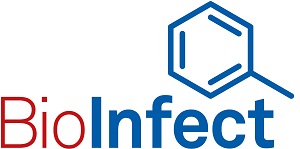Tackling AMR at BioInfect 2022

The global COVID-19 pandemic has highlighted the importance of infectious disease control and antimicrobial resistance is one of the biggest public health challenges of our time. The annual BioInfect conference examines at the critical issues relating to the challenges of new anti-infective development, the endemic problem of resistance, and the considerations for creating a truly global and effective response to antimicrobial resistance.
Back in person for the first time since 2020, this year’s BioInfect event took place at Alderley Park in Cheshire on 8th March and was well-attended, with 120 delegates, 10 exhibitors and 20 speakers from 13 companies.
With discussion themes ranging from global perspectives and drug discovery to patient engagement and the role of diagnostics, the one day event saw a busy agenda of keynote speeches, panel discussions, workshops, and networking.
The first keynote speaker, Dr Anand Anandkumar, Co-Founder & Chief Executive Officer of Bugworks Research Inc, commented on the effect of AMR of low- and middle-income countries (LMICs) such as India, South Africa and Southeast Asia, and how global strategies to combat AMR must be affordable and accessible. Dr Anandkumar also discussed the importance of identifying unmet needs such as better diagnostic capabilities, reducing the costs of antibiotic development, and conserving existing antibiotics, and implementing solutions ranging from stewardship programmes to pooled procurement approaches.
During his address, John H. Rex, MD, Chief Medical Officer of F2G Ltd, discussed the future of AMR reimbursement, which he predicted would reflect the societal value of new antibiotics. Dr Rex also highlighted the expense of getting a drug to market as one obstacle to new antibiotic development, identifying the importance of “push” incentives such as grants to encourage pre-clinical R&D coupled with “pull” incentives which are payments made without regard for use once the drug has been approved.
Echoing Dr Rex’s comments, Prof. Colm Leonard, Consultant Clinical Adviser for NICE, gave his perspective on the inadequacies of the current antimicrobial pipeline and the role of incentives to boost the development of new drugs, both in ensuring income at point of marketing and by supporting R&D. Prof. Leonard went on to outline a potentially effective new approach to monetising antibiotic development through the ‘subscription-type’ payment model being trialled by NICE and NHS England, which demonstrates the feasibility of innovative models that pay companies for antimicrobials based primarily on their value to the NHS as opposed to the volumes used.
Finally, Sébastien Coyne from Evotec Lyon presented the Vivo Mimetic Media platform for discovering and characterizing novel mode of action antibiotics, first by focusing on the recent lack of scientific breakthroughs in antibacterial drug discovery, and the need for a different approach. Mr Coyne explained how screening in alternative media gives access to overlooked drug targets, with applications also in translation studies. He concluded that this kind of novel approach will be essential in tackling AMR, alongside redesigning antibacterial discovery infrastructure, and fostering collaboration, partnership, training and cross-interaction.
Commenting on the event’s success, Dr Geoff Davison, CEO of Bionow, said: “With the global COVID-19 pandemic showing the importance of innovation in the fight against infectious disease, I am delighted that so many experts in the field of AMR, drug development and new technologies were able to come together to network, educate and share ideas. Bionow is proud to be involved in such an important health issue that affects us all.”
Kath Mackay, Director of Life Sciences at Bruntwood SciTech, said: “With AMR often referred to as the next hidden pandemic, it was inspiring to hear leading researchers discuss a range of topics from opportunities in drug development, to methods in which to disseminate research into patient engagement and education. It was great to host such an important set of debates and discussions at Alderley Park and bring together the scientific community.”
BioInfect 2022 is supported by Evotec, Infex Therapeutics, Bruntwood SciTech and Alderley Park.





















